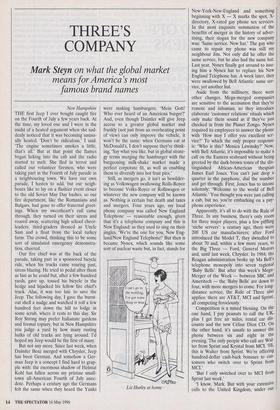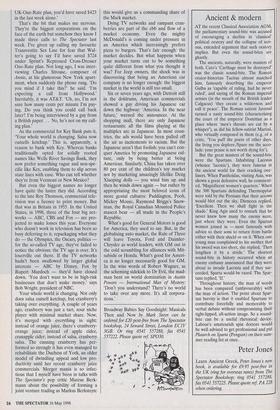THREE'S COMPANY
New Hampshire THE first Jeep I ever bought caught fire on the Fourth of July a few years back. At the time, my loved one and I were in the midst of a heated argument when she sud- denly noticed that it was becoming unusu- ally heated. 'Don't be ridiculous,' I said. `The engine sometimes smokes a little, that's all.' But at that point the flames began licking into the cab and the radio started to melt. She fled in terror and called our volunteer firemen, who were taking part in the Fourth of July parade in a neighbouring town. We have our own parade, I hasten to add, but our neigh- bours like to lay on a flashier event closer to the old Soviet May Day bashes, so our fire department, like the Romanians and Bulgars, had gone to offer fraternal greet- ings. When my sweetheart's call came through, they turned on their sirens and roared away, scattering high school cheer- leaders, third-graders dressed as Uncle Sam and a float from the local turkey farm. The crowd, thinking this to be some sort of simulated emergency demonstra- tion, cheered.
Our fire chief was at the back of the parade, taking part in a sponsored bicycle ride, when his trucks came roaring past, sirens blazing. He tried to pedal after them as fast as he could but, after a few hundred yards, gave up, tossed his bicycle in the hedge and hijacked his fellow fire chief's truck. Alas, it was too late to save the Jeep. The following day, I gave the burnt- out shell a nudge and watched it roll a few hundred feet down the hill to lodge in some scrub, where it rests to this day. Sir Roy Strong may prefer Italianate gardens and formal topiary, but in New Hampshire you judge a yard by how many rusting hulks of old trucks are lying around. I'd hoped my Jeep would be the first of many.
But not any more. Since last week, when Daimler Benz merged with Chrysler, Jeep has been German. And somehow a Ger- man Jeep is a concept I find hard to grap- ple with: the enormous shadow of Helmut Kohl has fallen across my pristine small- town all-American Fourth of July anec- dote. Perhaps a century ago the Germans felt the same when they heard the Yanks were making hamburgers. 'Mein Gott! Who ever heard of an American burger?' And, even though Daimler will give Jeep access to a greater global market and frankly (not just from an overheating point of view) can only improve the vehicle, it won't be the same: when Germans eat at McDonald's, I don't suppose they're think- ing, 'Say what you like, but in global strate- gy terms merging the hamburger with the burgeoning milk-shake market made a perfect corporate fit, as well as enabling them to diversify into hot fruit pies.'
Still, as mergers go, it isn't as bewilder- ing as Volkswagen swallowing Rolls-Royce to become Volks-Royce or Rollswagen or whatever the new company will be known as. Nothing is certain but death and taxes and mergers. Four years ago, my local phone company was called New England Telephone — reasonable enough, given that it's a telephone company and this is New England: as they used to sing on their jingles, 'We're the one for you, New Eng- land/New England Telephone!' But then is became Nynex, which sounds like some sort of nuclear waste but, in fact, stands for Liz Hurley at home New-York-New-England and something beginning with X — X marks the spot, X- directory, X-rated gay phone sex services. In the most exquisite summation of the benefits of merger in the history of adver- tising, their slogan for the new company was: 'Same service. New hat.' The guy who came to repair my phone was still my neighbour Jim. Not only did he offer the same service, but he also had the same hat. Last year, Nynex finally got around to issu- ing him a Nynex hat to replace his New England Telephone hat. A week later, they were swallowed by Bell Atlantic: same ser- vice, yet another hat.
Aside from the millinery, there were other changes. Mega-merged companies are sensitive to the accusation that they're remote and inhuman, so they introduce elaborate 'customer relations' rituals which only make them sound as if they've just checked in from the Planet Zongo. Nynex required its employees to answer the phone with 'How may I offer you excellent ser- vice?' To which the only proper response is: 'Who is this? Monica Lewinsky?' Now, with Bell Atlantic, it's impossible to make a call on the Eastern seaboard without being greeted by the dark-brown tones of the dis- tinguished African-American thespian James Earl Jones. You can't just drop a quarter in the payphone, dial the number and get through. First, Jones has to intone solemnly: 'Welcome to the world of Bell Atlantic.' You thought you were just calling a cab, but no, you're embarking on a pay- phone experience. Apparently, it's all to do with the Rule of Three. In any business, there's only room for three major players, plus a few piffling `niche servers': a century ago, there were 200 US car manufacturers; after Ford introduced the Model T, they dwindled to about 70 and, within a few more years, to the Big Three — Ford, General Motors and, until last week, Chrysler. In 1984, the Reagan administration broke up Ma Bell's telephone monopoly into seven regional `Baby Bells'. But after this week's Mega- Merger of the Week — between SBC and Ameritech — the 'Baby Bells' are down to four, with more mergers to come. For long- distance service, the Rule of Three also applies: there are AT&T, MCI and Sprint, all competing ferociously.
Competition is a mixed blessing. On the one hand, I pay peanuts to call the UK, plus I get free air miles, rental car dis- counts and the new Celine Dion CD. On the other hand, it's unsafe to answer the phone between six and eight in the evening. The only people who call are Wal- ter from Sprint and Krystal from MCI. 'Hi, this is Walter from Sprint. We're offering hundred-dollar cash-back bonuses to cus- tomers who switch over to Sprint from MCI.'
`But I only switched over to MCI from Sprint last week.' `I know, Mark. But with your extensive calls to the United Kingdom, under our UK-One-Rate plan, you'd have saved $423 in the last week alone.'
That's the bit that makes me nervous. They're the biggest corporations on the face of the earth but somehow they know I made three calls to The Spectator last week. I've given up calling my favourite Transvestite Sex Line for fear that Wal- ter's going to say I'd have saved $724 under Sprint's Repressed Cross-Dresser One-Rate plan. Not long ago, I was inter- viewing Charles Strouse, composer of Annie, at his glamorous New York apart- ment, when suddenly the phone rang. `Do you mind if I take this?' he said. `I'm expecting a call from Hollywood.' Inevitably, it was AT&T. `Uh, no, I'm not sure how many cents per minute I'm pay- ing. Do you think you could call back later? I'm being interviewed by a guy from a British paper. . . No, he's not on my call- ing plan.'
As the commercial for Key Bank puts it, `Your whole world is changing. Salsa now outsells ketchup.' This is, apparently, a reason to bank with Key. Whereas banks traditionally opted for solidly rooted names like Wells River Savings Bank, they now prefer something vague and non-spe- cific like Key, enabling them to slip across state lines with ease. Who can tell whether they're from Vermont or New Mexico?
But even the biggest names no longer have quite the lustre they did. According to the late Roy Thomson, commercial tele- vision was a licence to print money. But that was in Britain in 1955. In the United States, in 1998, three of the four big net- works — ABC, CBS and Fox — are pro- jected to make losses this year. Everyone who doesn't work in television has been so busy deferring to it, repackaging what they do — the Olympics, the Oscars, politics for the so-called TV age, they've failed to notice the obvious: the TV age is over. It's loserville out there. If the TV networks hadn't been swallowed by larger global interests — ABC by Disney, Fox by Rupert Murdoch — they'd have closed down. 'You don't want to be in high-risk businesses that don't make money,' says Bob Wright, president of NBC.
Your whole world is changing. Not only does salsa outsell ketchup, but cranberry's taking over everything. A couple of years ago, cranberry was just a tart, sour niche player with minimal market share. Now, it's merged with everything in sight: instead of orange juice, there's cranberry- orange juice; instead of apple cider, cranapple cider; instead of salsa, cranberry salsa. The cunning cranberry has per- formed so strongly it has even managed to rehabilitate the Duchess of York, an older model of dwindling appeal and low pro- ductivity until her recent cranberry juice commercials. Merger mania is so infec- tious that I myself have been in talks with The Spectator's pop critic Marcus Berk- mann about the possibility of forming a joint venture trading as Markus Berksteyn: this would give us a commanding share of the Mark market.
Dying TV networks and rampant cran- berries are part of the ebb and flow of a market economy. Even the mighty McDonald's is coming under pressure in an America which increasingly prefers pizza to burgers. That's fair enough: the market decides. But what happens when your market turns out to be something quite different from what you thought it was? For Jeep owners, the shock was in discovering that being an American car company is no longer enough: the biggest market in the world is still too small.
Six or seven years ago, with Detroit still in the doldrums, American commercials showed a guy driving his Japanese car down the highway: 'America. In the near future,' warned the announcer. At the shopping mall, there are only Japanese restaurants; all the films playing at the multiplex are in Japanese. In most coun- tries, the ads would have been pulled off the air as incitements to racism. But the Japanese aren't that foolish: you can't con- quer America by promoting Japanese cul- ture, only by being better at being American. Similarly, China has taken over 80 per cent of the children's toy market not by marketing amazingly lifelike Deng Xiaoping dolls — you wind him up and then he winds down again — but rather by appropriating the most beloved icons of more genial cultures: Paddington, Pooh, Mickey Mouse, Raymond Briggs's Snow- man, the Royal Canadian Mounted Police mascot bear — all made in the People's Republic.
What's good for General Motors is good for America, they used to say. But, in the globalising auto market, the Rule of Three will leave Toyota, Ford and Daimler- Chrysler as world leaders, with GM out in the cold scrambling for alliances with Mit- subishi or Honda. What's good for Ameri- ca is no longer necessarily good for GM. In the wise words of Robert Wagner, as the scheming sidekick to Dr Evil, the mad- man bent on world domination in Austin Powers — International Man of Mystery: `Don't you understand? There's no world to take over any more. It's all corpora- tions.'
Broadway Babies Say Goodnight: Musicals Then and Now by Mark Steyn can be ordered for £20 post-free from The Spectator bookshop, 24 Seward Street, London EC1V 3GB. Or ring 0541 557288, fax 0541 557222. Please quote ref SP030.



























































 Previous page
Previous page